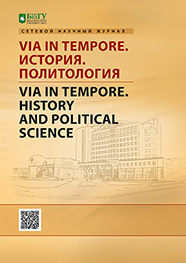ANTIQUE MOTIFS IN EPISTOLARY HERITAGE OF AENEAS AND PROCOPIUS OF GASA
DOI:
https://doi.org/10.18413/2687-0967-2020-47-2-251-258Keywords:
Late antiquity, Gaza, Enea of Gaza, Procopius of Gaza, letters, sophistAbstract
The article is devoted to the epistolary heritage of Procopius of Gaza and Enea of Gaza, whose works fall on a difficult period of history, the transition from one era to another. During the analysis of the letters we came to the conclusion that the main tasks of the authors were to preserve the ancient rhetorical tradition, the role of «sophist» and to search for sophistic self-determination in a Christianized society. The textual tradition of the letters of Procopius and Enea, their addressees, main topics, writing style, links to the classical authors are analyzed. On the basis of our study we can conclude that the influence of ancient culture left a deep mark even on correspondence between people. After all, the rhetorical and literary motives used by the authors to make the writing colorful should be understood and appreciated by the addressee. In general, both authors give a vivid picture of the preservation of the genres of ancient literature in Gaza in the Palestinian beginning of the 6 century A. D.
Downloads
References
Богомаз Е.Е., Болгов Н.Н. 2017. Письма Прокопия Газского. Научные ведомости Бел-ГУ, История, политология. 8 (257): 46–48.
Лопатина М.Ю. 2019. Мифологические сюжеты в эпистолярном наследии Энея Газ-ского. В сб. Классическая и византийская традиция. 2019. Белгород, БелГУ: 174–179.
Amato E. 2010. Rose di Gaza. Gli scritti retorico-sofistici e le Epistole di Procopio di Gaza. Alessandria, Edizioni dell'Orso, 697.
Amato E. 2006. Sei epistole mutuae inedite di Procopio di Gaza ed il retore Megezio. Byzan-tinische Zeitschrift, 98 (2): 367–382.
Amato E., Corcella A. 2007. Lo scambio epistolare tra Procopio di Gaza. Medioevo Greco, 7: 1–12.
Ciccolella F. 2010. Le Epistole. In: Rose di Gaza. Gli scritti retorico-sofistici e le Epistole di Procopio di Gaza. Alessandria, Edizioni dell'Orso: 120–155.
Civiletti M. 2002. Filostrato. Vite dei sofisti. Testo greco a fronte. Milan, R.C.S. Libri S.p.A., 734.
Enea di Gaza: Epistole. Ed. and trans. L.M. Positano. Naples, Libreria Scientifica Editrice, 1962, 129.
Garzya A. 1987. Per la storia della tradizione delle Epistole di Procopio di Gaza. In: Texte und Textkritik: Eine Aufsatzsammlung. Berlin, Akademie-Verlag: 161–164.
Gelzer T. 1967. Bemerkungen zur Sprache und Texte des Epikers Musaios. Museum Helvet-icum, 24: 129–148.
Kaster R.A. 1988. Guardians of Language: The Grammarian and Society in Late Antiquity. Berkeley, University of California Press, 560.
Maltese E.V. 1984. Un epistola inedita di Procopio di Gaza. La Parola del Passato, 39: 53–55.
Paulys Realencyclopadie der classischen Altertumswissenschaft: neue Bearbeitung. Bd.23.1. Ed. A. Pauly, G. Wissowa, K. Ziegler. Stuttgart, Druckenmüller Verlag, 1957, 1296 s.
Positano L.M. 1962. Enea di Gaza: Epistole. Napoli, Libreria scientifica editrice, 129.
Procopii Gazaei. Epistolae et Declamationes. Ed. Antonio Garzya. Ettal, Buch-Kunstverlag, 1963, 111.
Procopius Gazaeus. Opuscula rhetorica et oratoria. Ed. E. Amato. Berlin and New York, Walter de Gruyter, 2009, 144.
Seitz K. 1892. Schule von Gaza. Heidelberg, Carl Winter's Universitätsbuchhandlung, 60.
Speck P. 1966. Review of Procopii Gazaei epistolae et declamations. Byzantinische Zeitschrift, 59: 115–122.
Watts E.J. 2004. Student Travel to Intellectual Centers: What Was the Attraction? Travel, Communication, and Geography in Late Antiquity: Sacred and Profane, 19: 13–23.
Watts E.J. 2009. The Enduring Legacy of the Iatrosophist Gessius. Greek, Roman, and Byzan-tine Studies, 49: 113–133.
Westberg D. 2009. The Rite of Spring: Erotic Celebration in the Dialexeis and Ethopoiiai of Procopius of Gaza. In: Plotting with Eros: Essays on the Poetics of Love and the Erotics of Reading. Co-penhagen, Museum Tusculanum Press: 187–211.
Westerink L.G. 1967. Ein unbekannter Brief des Prokopios von Gaza. Byzantinische Zeitschrift, 60: 1–2.
Abstract views: 755
Share
Published
How to Cite
Issue
Section
Copyright (c) 2020 Via in tempore. History and political science

This work is licensed under a Creative Commons Attribution 4.0 International License.


